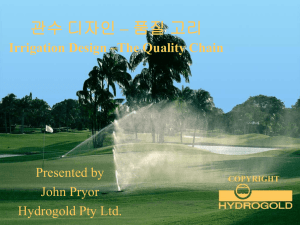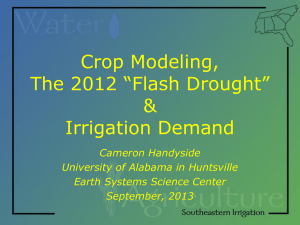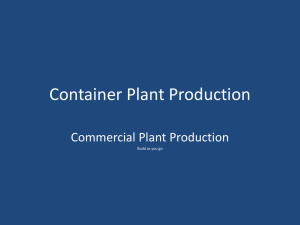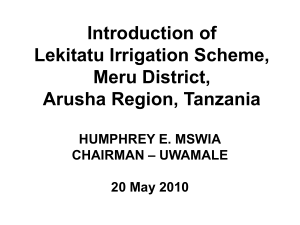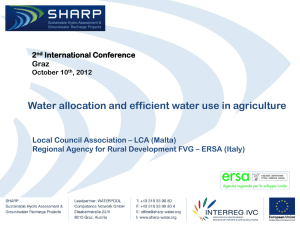Irrigation System Safety Part 3
advertisement
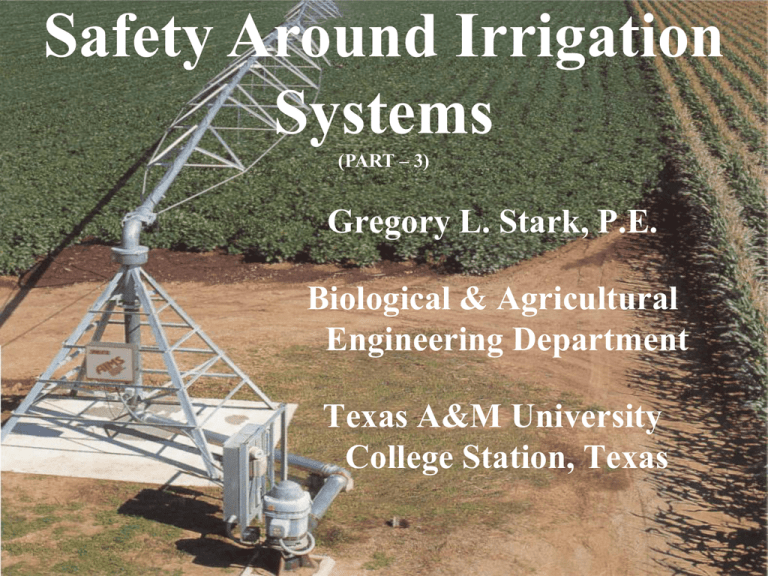
Safety Around Irrigation Systems (PART – 3) Gregory L. Stark, P.E. Biological & Agricultural Engineering Department Texas A&M University College Station, Texas Unsafe Work Practices • Installation of the safest and best maintained electrical system can still result in electrical accidents if unsafe work practices are used by personnel performing repair, maintenance or testing of the system. Irrigation Hazard - Electrical Contact • Safety Signs are required on electrical enclosures containing live electrical parts and potentially hazardous voltages to alert personnel performing repair & maintenance to the potential hazard. • The electrical voltage to most irrigation machines will be 240 or 480 volts three phase. Irrigation Hazard - Lightning • Stay away from selfpropelled irrigation machines during storms. • The large metal structures make good paths to ground and they tend to be large lightning “receptors” due to their height in the field. Irrigation Hazard Overhead Power Lines • Irrigation concerns with overhead power lines include: – Lifting aluminum irrigation pipe into overhead power lines. – Standing on irrigation systems while performing maintenance near overhead power lines. – Well drilling trucks/booms drilling wells close to overhead power lines. High Voltage Circuits • Un-qualified employees (not trained to work on the system) must stay a minimum distance of at least 10 feet in any direction from energized overhead power lines or open transformers. • For high voltage transmission lines, the distance is even farther…10 feet + 4 inches for each additional 10,000 volts over 50,000 volts. Irrigation Hazard Spraying Water on Power Lines • Don’t touch irrigation systems while they are spraying water on power lines. • Alert the power company. • Distance, stream size, water conductivity, voltage, and wind ALL effect the amount of current carried when an irrigation system sprays a power line. End gun spraying power lines & transformers Irrigation System Safe Work Practices • Wear appropriate clothing and use any necessary personal protective equipment. • Visually inspecting the equipment prior to touching. – Look for unguarded drive-lines and other mechanical hazards. – Locate the equipment disconnect switches/devices. – Look for broken or damaged equipment and electrical insulation on cords and open or damaged electrical enclosures. • Test the equipment (voltmeter and/or backhand) • Disconnect energy sources prior to repair, maintenance and testing. • Practice Lockout/Tagout Personal Protective Equipment (PPE) • Personal Protective Equipment (PPE) provides people protection from various hazards likely to arise in the workplace. • The most common types of PPE include head, ear, eye, hand, and foot protection. Clothing/Personal Protective Equipment • Before leaving for the site consider: – What clothing & personal protective equipment do I need? • Clothing - What’s the weather like? (hot or cold) – If it’s hot, bring drinking water……don’t rely on drinking water from the irrigation system. • • • • • Footwear - Boots…..Rubber or Leather? Hand Protection - Gloves….Rubber or Leather? Head Protection - Class 1 Hard Hat. Hearing Protection - Earplugs or Earmuffs. Eye Protection - Safety Glasses. Heat Stress • Individuals performing maintenance or testing of irrigation systems can be exposed to very high temperatures and possible heat stress. • Heat stress can cause various bodily distress including dizziness, elevated body temperature, nausea, and in severe cases can result in death. • Dress appropriately for the field and conditions • Ensure adequate drinking water or fluids are available (don’t rely on drinking from the irrigation system). Eliminate Problem Clothing & Jewelry/Accessories • Secure Long Hair & Eliminate: – Jewelry (rings, watches, chains, large belt buckles etc.) – Loose clothing (ties, scarves, etc.) • Metal jewelry is electrically conductive and long hair & loose clothing can easily become caught in rotating parts. Foot Protection • Typical foot hazards encountered when working around irrigation systems include rough, un-even ground and frequent muddy conditions. • Comfortable foot wear appropriate for wet, muddy conditions and un-even terrain is required. Hand Protection • Irrigation systems generally consist of significant quantities of machined metal with sharp edges and lots of protruding bolts and other connectors. • Appropriate hand protection in the form of gloves is generally warranted for technicians performing maintenance and testing on irrigation systems. Head Protection • Most owners and operators typically do not wear head protection when working on/around irrigation systems. • Falling objects are rarely ever encountered however, bumping your head on the structure can be painful. • A Class 1 head protective device (hard hat) is adequate for working around irrigation systems. Noise - Hearing Damage • Many fossil fuel power units will produce significant amounts of noise that will damage hearing slightly if exposure is sufficient. • Wear appropriate hearing protection when working around this type of How long do you want to stand next to this equipment. engine without hearing protection while it is running? Noise - Hearing Protection • Irrigation pumps powered by fossil fuel engines are extremely loud. • Hearing Protection can be provided through PPE by wearing either approved earplugs or earmuffs. • Cotton balls stuffed in your ears will not provide hearing protection. Eye Protection • Most owners and operators typically do not wear eye protection when working on/around irrigation systems. • Technicians performing maintenance or testing of most any type should have and use appropriate eye protection when working on irrigation systems even if owners and operators do not. Visually Inspect the System/Area • Locate the disconnect switches for the irrigation equipment – pump(s), irrigation machine(s), other equipment • Look for missing lids & enclosure covers exposing live electrical parts. • Look for damage from equipment or livestock on exposed electrical panels and cords. • Look for missing guards on moving and rotating equipment. Locate the Electrical Disconnects • Always identify the electrical disconnects for the equipment you are going to work on. – Look for labeling/evaluate layout of system. – Ask LandOwner/Manager Look for Damaged Equipment & Other Hazards Is there a good chance for this cord to be damaged due to it’s location? • Damaged Equipment – Open enclosures – Damaged insulation – Water in enclosures • Missing Guards • Chemical Spills • Structural Instability • Etc. It deserves a visual inspection to determine if there is any damage Test the Metal Structure • Check the system with a voltmeter. • Measure from metal water pump/pipe to earth (soil). • Measure from metal machine structure to earth (soil). • Voltage reading should be 5 volts or less. Voltmeter probe connected to metal structure 2nd voltmeter probe stuck in soil Back-Hand the System • Make it a practice to always lightly brush the BACK of your hand against any irrigation system metal structure or enclosure before grasping with your palm. • Grasping an energized metal structure member will cause your hand to clamp around it. Don’t test this way! Note the Jewelry! Do Test This Way. Always De-energize Equipment • Accidental or un-expected sudden starting of irrigation related electrical equipment is a major contributor to irrigation accidents. – You MUST de-energize equipment prior to physical inspection or working on equipment in order to do it safely. – Lockout/Tagout procedures should be followed. Lockout/Tagout • Means of ensuring electrical and other energy is off and others cannot turn it back on accidentally. • Most basic safety work practice. How many of you have a lock and use it? Lockout/Tagout • Turn the power off and apply a padlock to the controls or switch to indicate someone is working on it and it cannot be turned back on. • Tags can be used in some instances under certain conditions. • Only the person applying the lock/tag may remove it under normal conditions. Question? • Which disconnects (pump or irrigation machine) should be shut off while performing maintenance & repair? • Answer: – Both the pump & irrigation machine disconnects should be shut off…….the pump & irrigation machine may be electrically connected through metal piping, water in the pipes or on the ground. Tingles • If you suspect an electrical short or other problem due to a “tingle”….. – Do not touch the machine again. – Call the owner or manager and inform them of the incident and suggest they have a competent electrician check the system for any problems. Good Judgment • Perhaps the single most successful defense against irrigation accidents is an understanding of the potential hazards, following safe work practices, and continuous use of good judgement.
